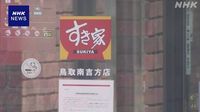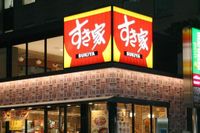In a shocking incident, a cockroach was found in the miso soup served at Sukiya, a prominent beef bowl chain, on January 21, 2025. This revelation came to light officially on March 22, 2025, after considerable public concern and speculation regarding the event, which highlighted serious lapses in food safety protocols at the restaurant.
It all began when a customer dining at the Tottori Minami Yoshikata store reported to staff that there was a foreign object in their miso soup moments before consumption. Upon inspection, employees confirmed the presence of the cockroach. The company later indicated that the contamination likely occurred during the preparation phase, specifically while multiple bowls were being assembled with ingredients for the miso soup, and regrettably, employees failed to conduct proper visual checks before serving.
Following the incident, the Sukiya store closed its doors temporarily to conduct sanitation checks and address the food safety breach. Public health officials conducted an on-site inspection two days later, allowing the restaurant to regain its operational status. This swift action indicated the company's response to a potentially hazardous situation, but the damage from the incident extended beyond that singular event.
For approximately two months, Sukiya refrained from making any public announcement regarding the contamination, which has drawn significant criticism. Many customers expressed their anxiety and dissatisfaction, feeling that the delay in communication left them vulnerable to a breach of food safety standards at the popular eatery. During this period, a remarkable surge of speculation circulated on social media and online forums, with many voicing their concerns about hygiene practices within the chain.
On March 22, 2025, upon releasing a statement on its official website, Sukiya finally acknowledged the incident. The company admitted, "The company acknowledges that the foul object was indeed present in the miso soup and has apologized, stating that employees did not properly check the product condition before serving it." In this response, they recognized the lapse in normal hygiene checks that should have been conducted before serving food. This admission was crucial in addressing growing public unease, especially in a time when food safety is paramount for consumers.
Furthermore, Sukiya stated, "We apologize for the inconvenience and concern caused to our customers and stakeholders, and we will strengthen our management system to prevent similar incidents." This promise comes as a commitment to improving the oversight of food preparation processes across all outlets nationwide, ensuring that such incidents do not recur.
The company also outlined several immediate changes to enhance its operational protocols. These include reinforcing training for employees on food safety standards, implementing stricter pre-service checks, and conducting assessments of the physical establishment to detect any potential threats to food integrity, such as cracks or openings that could allow pests entry. The public announcement highlights the importance of company accountability in all aspects of food service, from staff training to environmental assessments.
While customers were reassured with plans for bolstered safety measures, the episode has nonetheless cast a shadow over Sukiya's reputation. Many individuals who viewed the reports were left shaken and wary of returning to a place where their safety had been compromise. This incident serves as a significant reminder of the impact that lapses in hygiene can have not only on public health but also on consumer trust.
The controversy over the cockroach in miso soup underscores the critical need for transparency within the food service industry. In a world where consumers have increasingly high expectations for food safety, it is vital that restaurants such as Sukiya not only prioritize food hygiene but also communicate transparently with their patrons about any potential risks or incidents.
As Sukiya moves forward, it will be essential for the company to rebuild customer trust through visible improvements to its operations and commitments to safety. The firm promises that its management system will be fortified, aiming for a future where similar incidents are not just minimized but eliminated. The public will undoubtedly be watching closely to see how these changes are implemented and whether they succeed in restoring the confidence of patrons in their favorite beef bowl chain.





